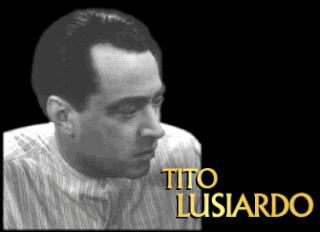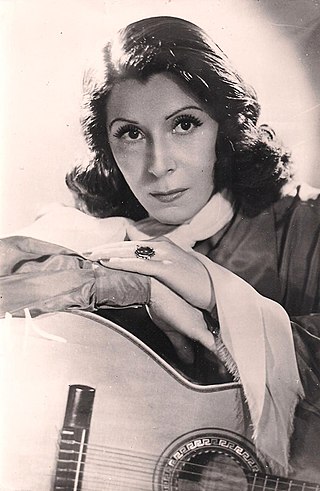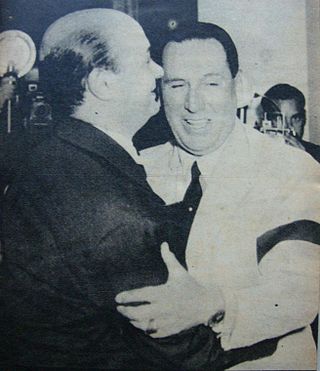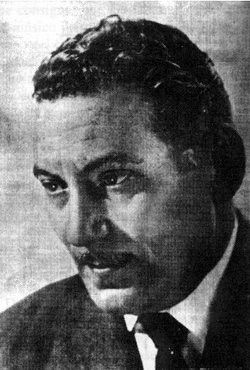Related Research Articles

Aníbal Carmelo Troilo, also known as Pichuco, was an Argentine tango musician.

Laura Ana "Tita" Merello was an Argentine film actress, tango dancer and singer of the Golden Age of Argentine Cinema (1940–1960). In her six decades in Argentine entertainment, at the time of her death, she had filmed over thirty movies, premiered twenty plays, had nine television appearances, completed three radio series and had had countless appearances in print media. She was one of the singers who emerged in the 1920s along with Azucena Maizani, Libertad Lamarque, Ada Falcón, and Rosita Quiroga, who created the female voices of tango. She was primarily remembered for the songs "Se dice de mí" and "La milonga y yo".

Luis César Amadori was an Italian-Argentine film director and screenwriter and one of the most influential directors in the cinema of Argentina of the classic era. He directed over 60 films between 1936 and 1967, writing the scripts to over 50 pictures.

Carlos Cores was an Argentine film actor, and film director.

Tito Lusiardo was an iconic Argentine film actor and tango singer of the classic era.

Luis Sandrini was a prolific Argentine comic film actor and film producer. Widely considered one of the most respected and most acclaimed Argentine comedians by the public and critics. He made over 80 appearances in film between 1933 and 1980.

Puerto nuevo is a 1936 Argentine tango musical, drama film directed by Luis César Amadori and Mario Soffici. It was written by Amadori and Antonio Botta. The music was performed by Uruguayan musician Francisco Canaro. Club Atlético Puerto Nuevo, founded in 1939, takes its name from the film.

Zulema Esther González Borbón, better known as Zully Moreno, was an Argentine film actress of the Golden Age of Argentine Cinema (1940–1960). She appeared in more than 70 movies, earning best actress awards from the Argentine Academy of Motion Picture Arts and Sciences and the Spanish Cinema Writers Circle.
Los Yonic's are a Mexican grupero band formed in 1975.

Elías Isaac Alippi was an Argentine actor, theatrical impresario, film director and theater director, who was born and died in Buenos Aires. He is also remembered as an excellent tango dancer.

Domingo Jhonny Vega Urzúa, commonly known as Américo, is a Chilean singer. He became known as the lead artist of Américo y la Nueva Alegría. He is the son of a locally known boleros singer, Melvin "Corazón" Américo. Americo was a coach on the second season of La Voz Ecuador in 2016.

Nilda Elvira Vattuone, better known by her stage name Nelly Omar, was an Argentine actress and singer during the Golden Age of Argentine Cinema. She was successful as a tango singer, performing on numerous radio shows and performed canción criolla. Her film career began in 1940. She was blacklisted after the ouster of Juan Perón for having sung his anthem, Soy La Descamisada and did not work again until the 1970s. From her comeback in 1972, she remained an active performer until her death.

Miguel Gómez Bao was a Spanish-born Argentine actor of the Golden Age of Argentine cinema. He appeared in films, such as Amalia, (1936), Safo, historia de una pasión (1943) and La pequeña señora de Pérez (1944). He also did much work for radio and appeared on Radio El Mundo in the late 1930s.

Ovidio Cátulo González Castillo was an Argentine poet and tango music composer. He was the author of many famous works, such as Organito de la tarde, El aguacero, Tinta roja and Caserón de tejas, María and La última curda, and El último café. The tango La calesita, which he composed with Mariano Mores, inspired the film of the same name directed in 1962 by Hugo del Carril.
Alfredo Jesús Fernández Sáenz was a Mexican film and television actor, nicknamed El Pichi.

Alberto Amado Ribero, known professionally as Tito Ribero, was an Argentine film score composer, composer, singer, and musician. In addition to having his own orchestra, he provided the film scores to over 200 movies, at his most prolific in the 1950s and 1960s. For Del otro lado del puente he won the Silver Condor Award for Best Original Score from the Argentine Academy of Cinematography Arts and Sciences in 1953.

Sabina Olmos (1913–1999) pseudonym of Rosa Herminia Gómez Ramos was an Argentine film actress of the Golden Age of Argentine Cinema (1940–1960).
Augusto Pedro Berto was an Argentine composer and bandoneón player who was the first composer to spread popular Argentine music in Europe. He is best known for his tango compositions.
Eduardo Arozamena Lira was a Mexican actor. His nickname was "El Nanche Arozamena".
The 23rd Annual Premios Gardel ceremony was held on July 23, 2021, and it was presented with no in-person ceremony due to the COVID-19 pandemic. The television broadcast of the show was in charge of the TNT Latin America, while LRA Radio Nacional provided radio coverage. The ceremony recognized the best recordings, compositions, and artists of the eligibility year, which ran from January 1, 2020 to January 31, 2020. The nominations were announced on May 7, 2021. The ceremony was hosted by television personalities Jey Mammón and Eleonora Pérez Caressi.
References
- 1 2 3 4 5 Orlando del Greco. "Botta, Antonio .... Letrista y autor teatral (10 diciembre 1896 - 10 mayo 1969)" . Retrieved 30 June 2019.
- ↑ "Puerto nuevo" (in Spanish). Cinenacional.com . Retrieved 1 July 2019.
- ↑ "Bartolo tenía una flauta (1939)". CINE NACIONAL. Retrieved 1 July 2019.
- ↑ Nathalie. "Si soy así". Tanguito, Argentine Tango Academy, London. Retrieved 1 July 2019.